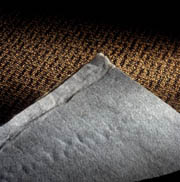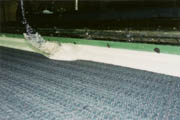
A new material manufactured by Urethane Soy Systems Co., Princeton, IL, uses soybean oil in place of petrochemicals to create a polyol used in manufacturing polyurethanes. SoyOyl was developed in part with funding from the United Soybean Board and the soybean checkoff.
The material is less expensive than petrochemical resources and uses a readily available renewable source of chemical building blocks for polyurethanes. Polyols made from SoyOyl react similarly to petroleum-based polyols in polyurethane formulations, producing rigid and flexible foam urethane composites with equivalent or better physical properties. Using soybean oil in an end market such as plastics also adds value to our nation’s agricultural resources.

Currently, several companies are using SoyOyl in their polyurethane applications. Ultra Foam Inc., a manufacturer of polyurethane products for original equipment manufacturers, is using SoyOyl technology. Universal Textile Technologies is manufacturing polyurethane carpet backing and padding from SoyOyl polyols. In addition, a spray-foam insulation has been developed from SoyOyl that can be used in both commercial and residential construction.
It is estimated that North American demand for soy-based polyols will exceed 700 million pounds within five years, with an equivalent demand internationally. A growing interest in using renewable-resource-based products is the driving force behind this demand, as are cost efficiency and high performance. In fact, the processes used to manufacture SoyOyl consume less energy than those of petroleum-based polyols.